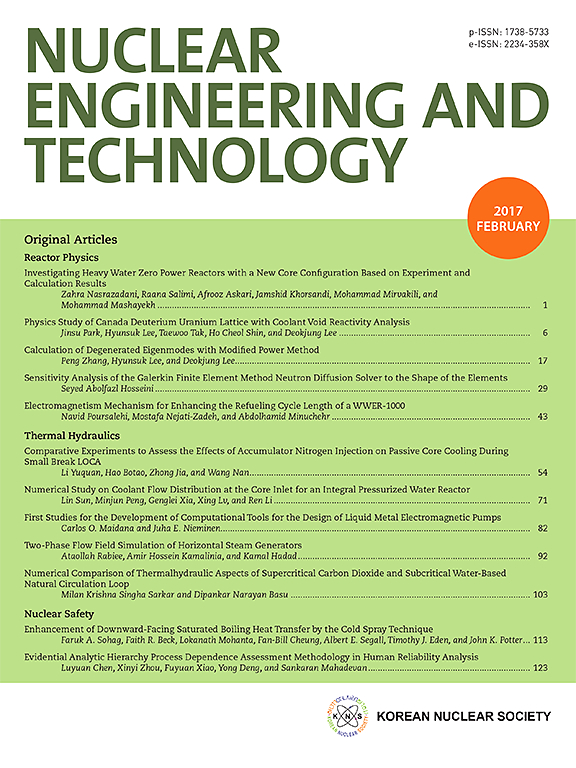Self-supervised denoising method for single neutron image based on the S2S-NR network
IF 2.6
3区 工程技术
Q1 NUCLEAR SCIENCE & TECHNOLOGY
引用次数: 0
Abstract
Fast neutron radiography technology has unique application advantages in the field of non-destructive testing. However, during the imaging process, the imaging system is inevitably affected by various factors, leading to significant noise contamination in the resulting neutron images, which affects subsequent processing and analysis. In recent years, self-supervised learning has become a powerful tool for single image denoising. We propose a self-supervised denoising method based on the Self2Self-Neutron Radiography (S2S-NR) network to remove noise from fast neutron images. We train the network using a single noisy fast neutron image, employ gated convolution for feature extraction, and perform dropout training on Bernoulli sampling instances of the neutron image. The results are estimated by averaging the predictions from various instances of the network with dropout. Furthermore, we incorporate no-reference image quality assessment metrics into the loss function to optimize the training process. Experimental results show that the method achieves state-of-the-art denoising performance on both simulated and real fast neutron images, demonstrating the effectiveness and practicality of this method as a potential solution for the denoising task in fast neutron imaging.
基于S2S-NR网络的单中子图像自监督去噪方法
快中子射线照相技术在无损检测领域具有独特的应用优势。然而,在成像过程中,成像系统不可避免地会受到各种因素的影响,导致生成的中子图像受到明显的噪声污染,影响后续的处理和分析。近年来,自监督学习已成为单幅图像去噪的有力工具。提出了一种基于self- 2self neutron Radiography (S2S-NR)网络的自监督去噪方法,用于去除快中子图像中的噪声。我们使用单个带噪声的快中子图像训练网络,采用门控卷积进行特征提取,并对中子图像的伯努利采样实例进行dropout训练。结果是通过对带有dropout的各种网络实例的预测进行平均来估计的。此外,我们将无参考图像质量评估指标纳入损失函数以优化训练过程。实验结果表明,该方法对模拟快中子图像和真实快中子图像的去噪性能都达到了最先进的水平,证明了该方法作为快中子成像去噪任务的潜在解决方案的有效性和实用性。
本文章由计算机程序翻译,如有差异,请以英文原文为准。
求助全文
约1分钟内获得全文
求助全文
来源期刊

Nuclear Engineering and Technology
工程技术-核科学技术
CiteScore
4.80
自引率
7.40%
发文量
431
审稿时长
3.5 months
期刊介绍:
Nuclear Engineering and Technology (NET), an international journal of the Korean Nuclear Society (KNS), publishes peer-reviewed papers on original research, ideas and developments in all areas of the field of nuclear science and technology. NET bimonthly publishes original articles, reviews, and technical notes. The journal is listed in the Science Citation Index Expanded (SCIE) of Thomson Reuters.
NET covers all fields for peaceful utilization of nuclear energy and radiation as follows:
1) Reactor Physics
2) Thermal Hydraulics
3) Nuclear Safety
4) Nuclear I&C
5) Nuclear Physics, Fusion, and Laser Technology
6) Nuclear Fuel Cycle and Radioactive Waste Management
7) Nuclear Fuel and Reactor Materials
8) Radiation Application
9) Radiation Protection
10) Nuclear Structural Analysis and Plant Management & Maintenance
11) Nuclear Policy, Economics, and Human Resource Development
 求助内容:
求助内容: 应助结果提醒方式:
应助结果提醒方式:


